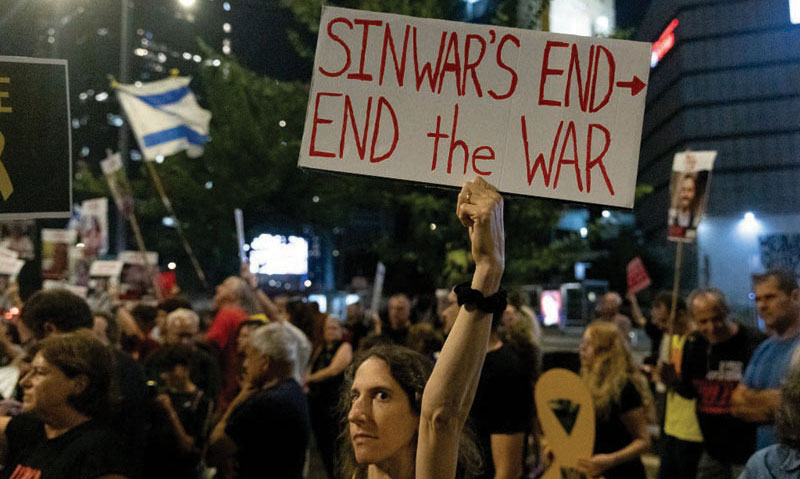 A protester holds a sign during a demonstration calling for a hostage deal on Oct. 17, 2024 in Tel Aviv, Israel.
Amir Levy/Getty Images
A protester holds a sign during a demonstration calling for a hostage deal on Oct. 17, 2024 in Tel Aviv, Israel.
Amir Levy/Getty Images One analyst explained that the killing of Hamas leader Yahya Sinwar is an opportunity. Another declared it a prelude to victory. A third asserted it changes the region. A fourth disagreed. After several days, thousands of spilled words, countless hours of television chatter, here’s what we can say with certainty about the killing of Sinwar: It is a Rorschach test. Tell me what you thought before the killing, and I’ll tell you what you think about the impact of the killing. Tell me your plan the night before the killing, and I’ll tell you your plan for the day after.
Should Israel rush to negotiate for the hostages, conceding more now than before to bring them home? You’d be hard-pressed to find someone who thought that’s the proper plan before the killing, who didn’t explain afterward that now, indeed, the time has truly (!) come. And how about a ceasefire? The Biden administration pressured for a ceasefire prior to the killing, and – surprise! – its officials consider the killing of Sinwar a golden opportunity to strive for … a ceasefire. Or, as President Biden calls it: “an opportunity to seek a path to peace.” Imagine that: Had Israel accepted Biden’s plan months ago, Sinwar would not be killed, and an “opportunity” for peace would have been lost.
We could pile on more examples, but the principle is the same. Sinwar’s killing is proof of something. Of what? Of whatever I previously thought. In this sense, it is no different from most of what has transpired since the first day of this war. Yes, Oct. 7 was also a Rorschach test. Is the attack proof of the Gaza 2005 disengagement’s failure, hence a definitive argument for returning to occupation, maybe even resettlement? Or is the attack proof of the failure of Netanyahu’s strategy of bolstering Hamas as a barrier to the Palestinian Authority’s political aspirations? Is it proof that the two-state solution is a mirage, or proof that the two-state solution is more urgent than ever?
Some interpret the event this way, others that way. Typically, what we get is a preconceived opinion, reinforced by realities. Oct. 7 is proof that the judicial reform was disastrous and brought division and destruction. No, Oct. 7 is proof that the opposition to the judicial reform was disastrous and brought division and destruction.
A survey we conducted a few weeks after the attack taught us early in the war that in the eyes of a significant part of the Israeli public, the dramatic event is not an opportunity for self-examination but rather one for reinforcement of past beliefs. True — a significant portion of the public agreed at the time with the general statement that “on Oct. 7, all strategies collapsed.” But the moment those same respondents were given the opportunity to specify which “strategies” collapsed, they aligned according to their political camps and preexisting positions. Each side tended to claim that it was the strategies of the other side that had collapsed.
A survey we conducted a few weeks after the attack taught us early in the war that in the eyes of a significant part of the Israeli public, the dramatic event is not an opportunity for self-examination as much as one for reinforcement of past beliefs.
This phenomenon offers an interesting opportunity to observe the psychological process that ends up being referred to as a rigid conception. Want to know why we were all captives of a rigid conception? Look at the response to the killing of the master terrorist Sinwar, and you can see how it happens in real time. People have a position. Then a dramatic event occurs. Then people interpret this dramatic event in light of their positions. Instead of a dramatic event being an opportunity for reassessment, doubt, or the challenging of foundational assumptions, the dramatic event only strengthens the pre-existing position, anchoring it. Of course, occasionally there are events so powerful that they do shake core beliefs. After Oct. 7, it will be hard for anyone to maintain the position that Hamas is a potential interlocutor for peace talks. But on most things, and in most cases, events are not an opportunity to challenge beliefs as much as an opportunity to strengthen them.
Yet, it is necessary to pose a question: Was the pre-Sinwar-killing position that it is time to end the war too impatient? Were Americans and Israelis who demanded a ceasefire were mistaken in their assumption that Israel has nothing more to gain in the fight?
And yet, it is necessary to also pose the opposite question: Now that Sinwar is dead — a result we all wanted — are we truly better off when it comes to having a reasonable plan for the future of Gaza?
The death of Sinwar — like that of Nasrallah before him — is an important achievement. Every leader who threatens Israel should know that such policy could lead to his personal destruction. But the death of Sinwar – like that of Nasrallah before him – is also a limited achievement: The challenge of Gaza after him is very similar to the challenge of Gaza before him.
Something I wrote in Hebrew
When Sukkot is over, the Knesset will reconvene to discuss, among other things, the demand of the ultra-Orthodox parties to pass a law that exempts their youngsters from military service. Here’s a paragraph I wrote about this:
If you want to describe it in a somewhat pompous way, you can say that a decision was made by the coalition to take a risk. What is the nature of the risk? The coalition will pass an exemption law — which it will call a conscription law — and hope for the best. That is, its members will hope that the public will not protest, they will hope that the reservists will not react harshly, they will hope that the wives of the reservists, and the mothers of the regulars, will not take to the streets. They will hope that because of the situation — war — or the mental state — a feeling of helplessness — the public will grumble but not react.
A week’s numbers
As a survey by INSS shows, a string of Israeli
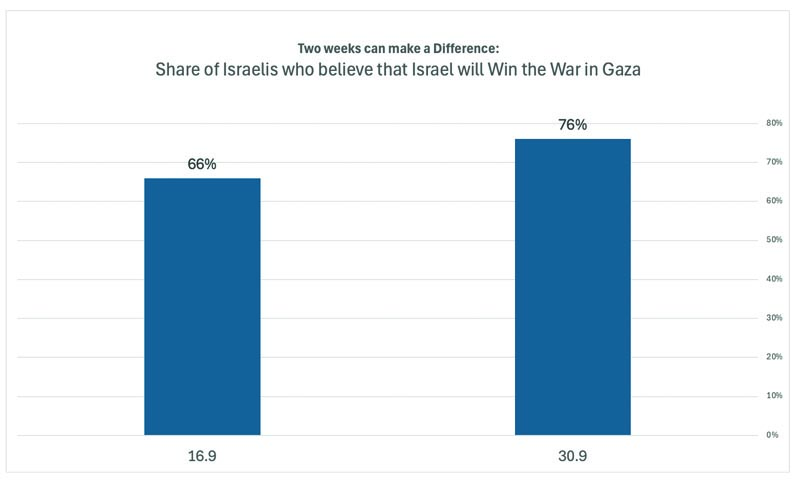
s tactical achievements convinces the public that the war can be won (these numbers were collected even before the killing of Sinwar).
A reader’s response
Donna Mentzov asks: Do Israelis want Trump to get elected? Answer: Most of them – yes.
Shmuel Rosner is senior political editor. For more analysis of Israeli and international politics, visit Rosner’s Domain at jewishjournal.com/rosnersdomain.









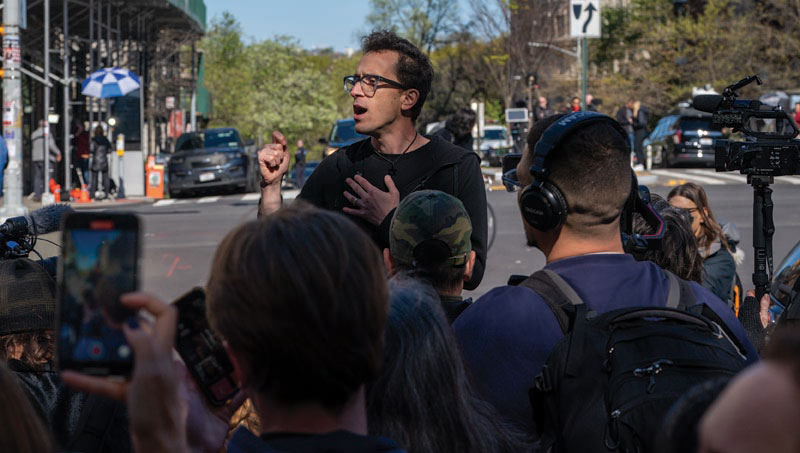


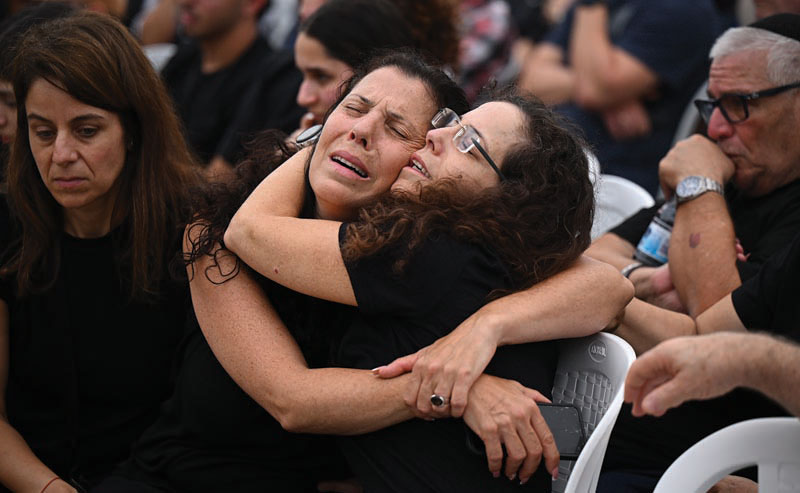


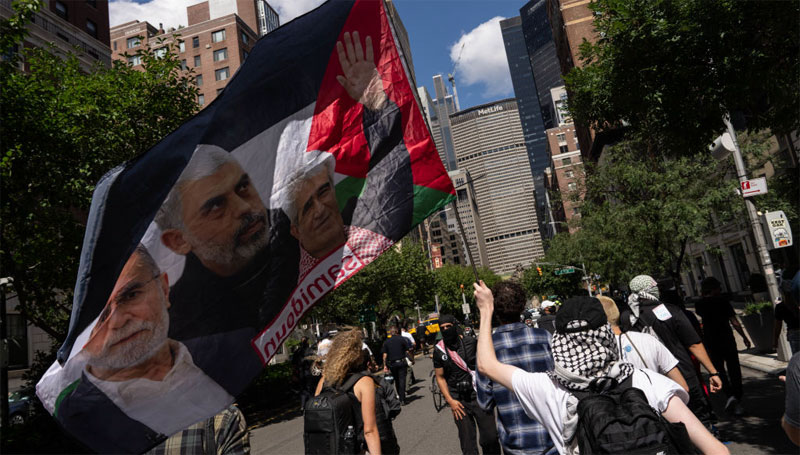






 More news and opinions than at a Shabbat dinner, right in your inbox.
More news and opinions than at a Shabbat dinner, right in your inbox.